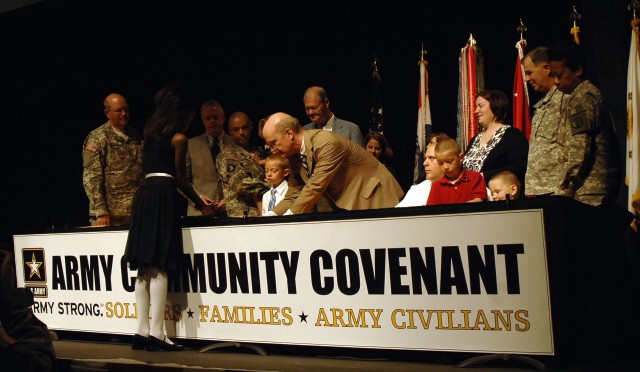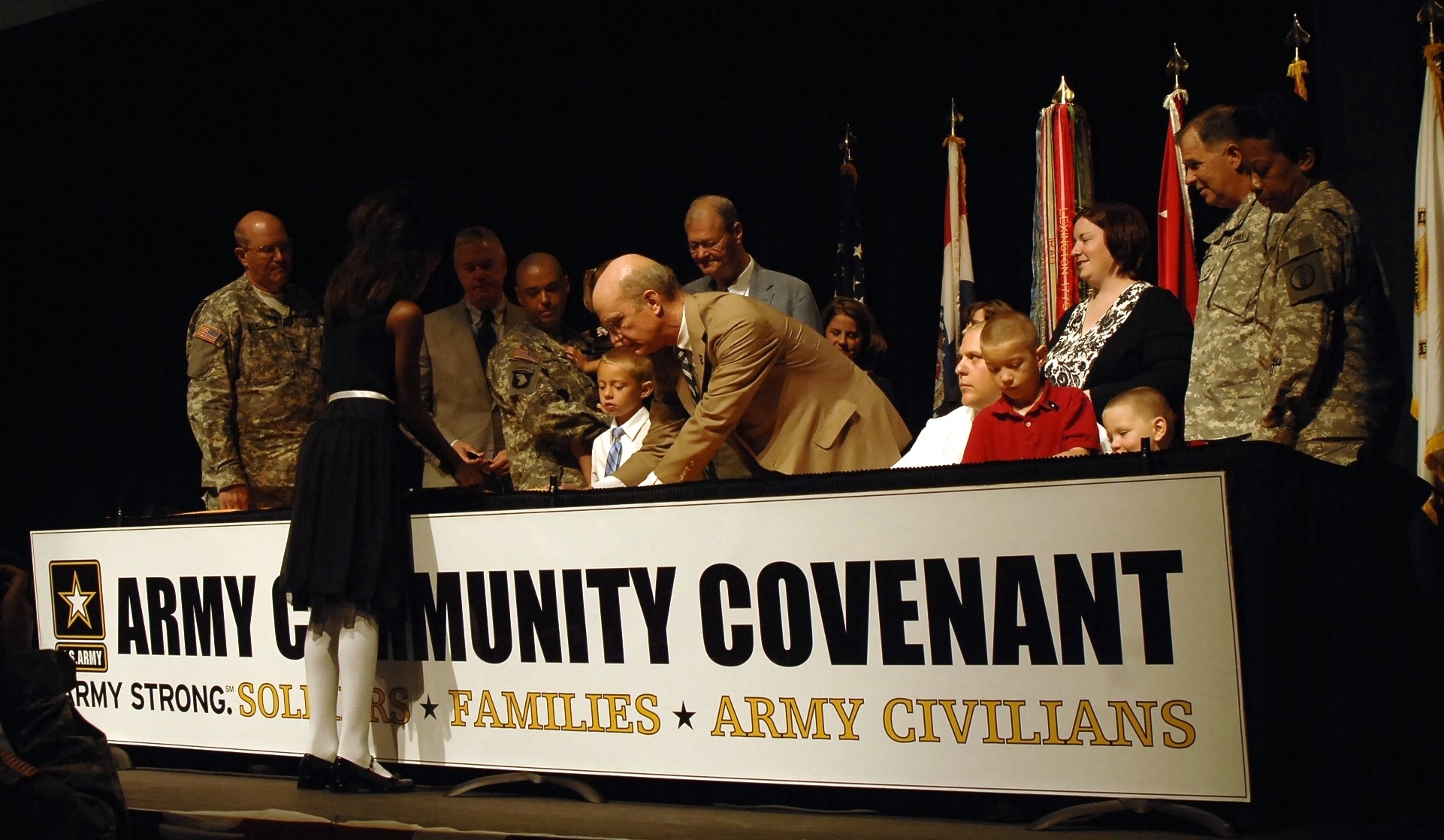
FORT LEONARD WOOD, Mo. - The secretary of the Army and chairman of the House Armed Services Committee toured Fort Leonard Wood and signed an Army Community Covenant at Waynesville High School with the Fort Leonard Wood commanding general Friday.
Maj. Gen. William McCoy, Maneuver Support Center and Fort Leonard Wood commanding general, hosted the visit from Honorable Pete Geren, Secretary of the Army, and U.S. Representative Ike Skelton (D-Mo.).
The Army Community Covenant signing - before hundreds of Soldiers, families and civilians - served as the highlight of the trip. The signers included Geren, Skelton, and McCoy, along with Missouri Lt. Gov Peter Kinder; Maj Gen. King Sidwell, Missouri National Guard adjutant general; Col. Sharon Gresham, MANSCEN chief of staff - Army Reserve; Dr. Judene Blackburn, Waynesville Schools superintendent; Staff Sgt. Jamie Holt and family, representing the Soldiers and families of Fort Leonard Wood; and retired Staff Sgt. Daniel Barnes and family, representing Wounded Warriors and their families.
Geren spoke of the varying aspects that make Army Community Covenants important.
"The Community Covenant is significant on several levels," Geren said. "We thank the communities like this one for what they do, we invite them to look for ways to do more; and it's a chance to bring the community together and thank them."
Fort Leonard Wood's commanding general thanked the community for their part in making the installation "World Class in all We Do."
"What continues to make us better every single day is the community that surrounds us," McCoy said. "It's your support that makes us successful."
Skelton spoke of his concern of the Army becoming insular, and thanked the Fort Leonard Wood community for being involved.
"You're exhibit A in welcoming and meeting and greeting those in uniform with dignity and respect," Skelton said. "That's what these covenants are all about, that's what you are all about - putting your arms around (the Soldiers and their families) and welcoming them and treating them like natives."
Barnes' wife, Gretchen, shared how important community was to their family when they found out Daniel was injured in combat. She also explained why the family chose to return to Fort Leonard Wood, once Daniel was out of the hospital.
"It's where we felt at home and that's why we came back and why we're going to stay," said Gretchen Barnes. "It's the people."
The Secretary of the Army echoed her statement.
"There's no community in America that does more or shares the heart of the Soldiers and their families more than the Fort Leonard Wood community," Geren said.
Besides taking part in the covenant signing ceremony, Geren and Skelton spent the balance of their time on Fort Leonard Wood seeing what the Army has to offer and meeting Soldiers.
They visited the Counter Explosive Hazards Center, Spc. Paul R. Smith Hall, where Lt. Col. Eric Goser, CEHC director, gave an explanation of the courses taught in the center. Goser also provided a mine dog demonstration and a route clearance equipment exhibit.
Following the counter-explosive tour, the group traveled to the U.S. Army Chemical, Biological, Radiological and Nuclear school. Col. Peggy Combs, 3rd Chemical Brigade commander, escorted the group on a driving tour and through the 1st Lt. Joseph Terry CBRN training facility. They observed Air Force and Army units in training as first responder.
Following the community covenant signing, Geren, Skelton and McCoy had lunch with military police Soldiers, visited the General Leonard Wood Army Community Hospital and spoke with Soldiers from the Warrior Transition Unit.
Geren shared how there are only 2.4 million men and women in uniform today with over 300 million U.S. citizens, meaning less than 1 percent of the nation's population is in the Army. He quoted Winston Churchill, British prime minister during World War II, to show the importance of those numbers: "Never in the field of human conflict was so much owed by so many to so few."
"And that debt continues to grow every day," Geren said.

Social Sharing